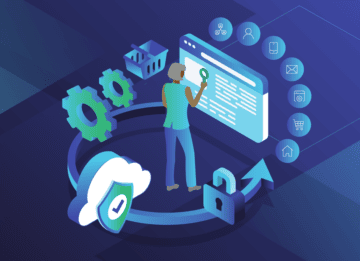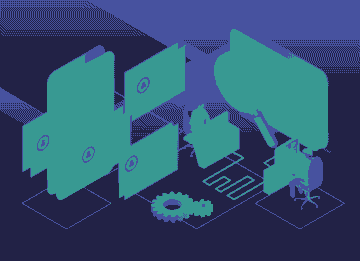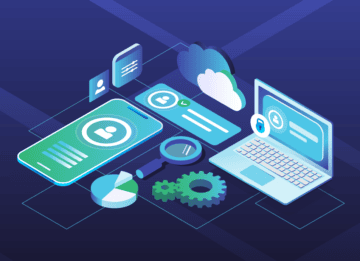
Be Awesome With People: Why Focusing on Mental Health Matters
Battling Burnout in an Unprecedented Year
Collaboratively Written by Michelle Warren and Caroline Graham
Life is beautiful and messy, complex and ever-changing. It’s simple at times and hard as hell at others. In a non-pandemic setting, the battle against burnout is a hard-fought challenge. This year, however, it has taken an even greater effort to arm ourselves with the mindfulness needed to tame the beast of productivity. As the pandemic set in, most of us were forced into a cocoon-like state of isolation, soon morphing into full-time remote workers. Companies rushed to evaluate what they needed to do (and not do) to sustain a healthy, optimal, and productive work environment.
Part of being #AwesomeWithPeople is creating a space where our team members feel comfortable bringing their whole, authentic selves to work. This means recognizing them as more than just employees, but also as the intelligent, creative, caring, determined, and dynamic humans that they are. At FullContact, we recognize that work-life is only one piece in the puzzle of life. In order for our teams to be able to bring their sharpest minds to the table, work-life must leave space for other aspects of their life and well-being to fit into place.
In assessing our own strengths and weaknesses at FullContact, we spotted a trend–our team members were not taking as much time off as compared to previous years.
Typically when this type of trend surfaces, a domino effect of mental health challenges is set off: Less time off = more work = more potential for burnout. Burnout leads to emotional exhaustion with symptoms ranging from the feeling of being drained or isolated to being completely unable to cope. Overall productivity takes a serious hit not only at work, but across all facets of a person’s well-being.
It’s a slightly counterintuitive concept, one would think that the equation should read: More time working = Increased productivity, but research has shown the opposite to be true. According to this 2018 article published by the Society for Human Resource Management, some of the great benefits to taking time off include improved mental health, greater productivity, and lower stress levels. So if science says that it is essential to your well-being to take a day off, why is it so difficult to do?
Our teams are dedicated. They show up to work each day armed with the grit and tenacity to face the most complex industry quandaries and quickly construct innovative solutions to solve them. They are driven and deeply connected to the impact they make, so it’s easy to see how they might forget to stop and take a breather. Keeping that in mind, FullContact leadership began to prescribe “Mental Health Days” to encourage our teams to hit pause and refocus. Mental Health Days are pre-scheduled days in which the entire location or company is closed and off-the-grid.
You may be wondering, “If FullContact offers Unlimited Vacation Time, why would it be necessary to schedule Mental Health Days? Can’t employees just schedule the day off when they need it?” The simple answer is yes, they can. But in a fast-paced, fast-changing business climate like FullContact’s, it can become a little more complicated. As employees attempted to simply step away for the day, it became evident that self-prescribed Mental Health Days were only allowing for a limited or temporary disconnect. An “out-of-office” message may be playing an all-star defense, but emails are a notoriously relentless opponent and Slack messages never seem to sleep.
However, when everyone is prescribed the day off, a more true disconnect takes place and solace can be found. The cacophony of the information highway tends to quiet and decongest as people begin to loosen the grip on their email and connect with the present moment. Given the space to define what is important to them, we have found that people are less fearful of not meeting an unattainable bar of productivity or connectedness, giving everyone a much-needed moment of silence.
The choice to designate these scheduled respites as “Mental Health Days” was intentional. Our aim is to be a champion of mental health awareness by dismantling the mental health stigma that still exists today. Our US medical benefit plans include an Employee Assistance Program that provides mental health counseling, but unfortunately, we discovered that our benefits offering in India did not include this same coverage. To solve this gap, our India HR team coordinated one-on-one counseling sessions with a local psychologist for interested employees. Participants remarked great appreciation for the impact the session had on their outlook and the coping tools it provided for future use. FullContact feels it important to not only call out the necessity of taking care of our minds and bodies, but to demonstrate our commitment to our core value of being #AwesomeWithPeople by supporting our employees’ ability to be successful on their personal journeys to mental health.
As poet Rupi Kaur states, “You do not just wake up and become the butterfly- growth is a process.”
When a team member feels refocused, rejuvenated, and supported, they’re prone to increased hopefulness and engagement with life. We encourage our team members to explore their own mental health metamorphosis by taking Mental Health Days as prescribed: With plenty of water and whatever brings them peace and joy.
Recent Blogs
-
 February 25, 2025 Introducing Email Signals: Unlock Powerful Email Engagement Insights Customer 360, Customer Experience, Marketing & Sales, Enrich API
February 25, 2025 Introducing Email Signals: Unlock Powerful Email Engagement Insights Customer 360, Customer Experience, Marketing & Sales, Enrich API -
 August 28, 2024 The Sales Rep's Guide to Maximizing Productivity with Website Visitor Data Acumen, Media Personalization, Marketing & Sales
August 28, 2024 The Sales Rep's Guide to Maximizing Productivity with Website Visitor Data Acumen, Media Personalization, Marketing & Sales -
 August 6, 2024 Turn Visitors into Leads: How to Install the Acumen Web Tag in 5 Easy Steps Acumen, Website Recognition
August 6, 2024 Turn Visitors into Leads: How to Install the Acumen Web Tag in 5 Easy Steps Acumen, Website Recognition